Hello, folks! Whatever may be the reason you’ve come here, I’m glad you did. As a writer, I have encountered a bevy of problems when trying to learn to write as most of us do, and finding solutions to those problems wasn’t easy, for the required articles spread out on different sites making them hard to find. So, to save time for myself and others who have gone through/would be going through a similar muddlesome experience, I'm making this series. I believe, one need not know the ins and outs of the craft of writing to teach others how to write, but one should at least know:

And I want to share my views on how to properly learn to write Dialogue, thereby make this Mastering Dialogue series one of the time-saving reads for as many dialogue-delving writers as possible. I, by no means, am a writer who knows the ins and outs of this craft, but I’m aspiring to be that writer, which is also a reason why I’m writing this series. Having said that, the main reason is to help others who are looking for that one tutorial series that teaches more than they can learn from thousands of articles spread out on multiple websites.
Now, you may ask why I’m focusing on dialogue writing and not on other aspects as well.
Well, I’m focusing on dialogue because there are no great emotional scenes or drama without it, no great romance without it, no great fight scenes without it, in fact, no great fiction without it. No matter how good of a narrator one might be, he/she can’t clutch the hearts of readers with narration alone.
Ever wondered why movie scripts have just dialogues but no narration?
I think you now know the answer.
A great novel can be written without using any narration whatsoever, and just by using dialogues, dialogue attributions, dialogue tags, and dialogue cues, and such—where our descriptions and details of the characters and our fictional world subtly lie in.
However, Narration is still used by everyone because of various reasons like:
The reasons can go on; you get the point. However, it’s neither narration nor exposition but dialogue which is the key that connects your readers with the characters in your story.
That is why knowing how to write a great dialogue is a must if you want to write great stories.
I’ve been writing fiction for only a few years, and I am still learning things. I will be improving/updating this series as I learn new things and concepts. As for how many parts there will be, I think the number will comfortably cross 30. After covering the dialogue, I will talk a bit about narration and exposition as well.
This Mastering Dialogue series is made so that it will help everyone improve their skills in dialogue writing. This series is gonna be long as dialogue writing is a huge concept and is also probably the most important and necessary skill for anyone who's aspiring to become a professional writer for novels or any writing jobs.
In this zeroth part, I won't be going into the technicalities of writing dialogue but will only talk about the basics that revolve around writing well in general.
First of all, what is fiction?
It’s a writer’s duty to mold the story so that it feels real. And there's your fiction.
Now, are you a good writer? What do you think about your own writing?
If you think it’s great then that’s fine. But before you reassure yourself again, just go and ask ten more people (asking avid readers or writers would be good) on how they feel about your work. And…

WOULD YOU BELIEVE ME?
WAIT, JUST WAIT...
WELL…
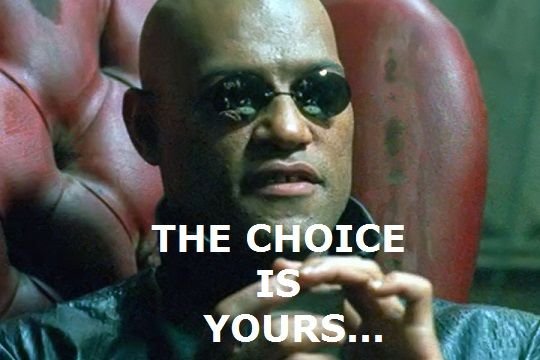
If you chose to come out of the matrix, then I appreciate that, but I won't congratulate you just yet because you just started, and there's still so much more to do... If you chose to not come out, however, you can rest inside as you always do.
Now, to those who got out of the shell where dreams delve in, let's now delve into reality, shall we?
No matter what you may think about your writing, it doesn't matter. If you are writing for the first time, then your writing most likely sucks. I've been there, and trust me, every good writer's been there.
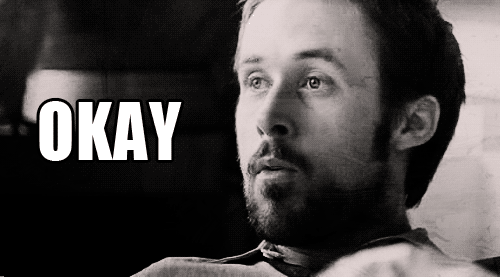
The sad truth is, you may think your writing is great, but if most others think it’s garbage, then I think you should consider changing your style of writing. Because there’s something seriously affecting your novel in the wrong way. It need not be the plot by any means. It may just be the way you write from how you construct a dialogue and let the characters interact to how your basic writing style is in itself.
To learn to run, you should first learn to stand. To learn to stand, you should first try. And without a doubt, you’ll fall many times before you finally stand on your feet and be able to walk without falling no more or at least not as often.
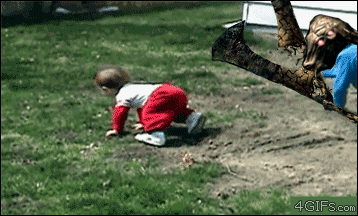
And, in a similar way…
To write well, you should first know how not to write. And also to not write well in the wrong place, like the kid who did well to stand but was standing at the wrong spot. (Poor kiddo. Hope, he wasn’t hurt in the process.)
Because, if you don’t know how you should not write, you may think that crawling is actually walking.
A kid may think he’s walking while he’s still crawling on four legs. Only by looking at other adults (not other kids), will he learn that he’s doing it wrong and that he needs to stand on his two legs.
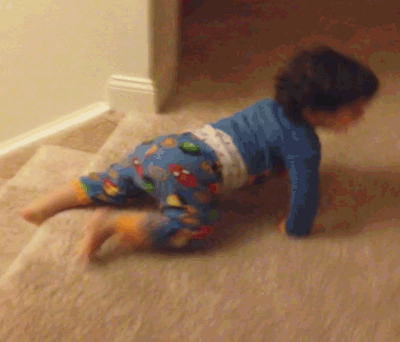
Only by reading and analyzing how other good writers are writing, and comparing it to what you wrote, will you be able to tell not only how different both the writing styles are, but how the other writers are conveying their messages using their scenes. Their fights may just be one page in length, while you are using twenty pages. Their love scenes maybe five pages long, while you are only using a paragraph or two for that.
Depending on the genre you’re writing in, your scenes can vary with other writers. So look at other novels that are of the same genre. But don’t follow them blindly.
Even some established writers write many anti-climactic scenes i.e. They build the tension for a scene from quite a few chapters only to end it in a single paragraph much less a page. For example, imagine how if you’ve trained your protagonist for the first hundred pages of the novel by teaching him this martial art and that martial art and whatnot, but when the time comes for him to actually fight for the first time, he’s surrounded by a dozen or even a hundred men, but you just kill them all off in a paragraph or two. This tactic of extremely short fights can be used by overpowered characters, but still, they should be handled correctly, or else the fight scene will simply be bland. Your readers will forget the scene as fast as they finished it.

Do you think, a protagonist who’s in his first fight can fight with a dozen men and face no problem whatsoever? I’d say that’s bullshit. He must be going through tons of psychological stress as he goes through the fight, be it excitement or trepidation or disdain, whatever it is, you should show that. Let the readers know about the characters, let them relate to the characters. Only that will save your novel and will keep the readers continuing even when they don’t like where the plot may be heading. Because they are already invested in your characters as they got to know them, from in and out.
To be able to write good characters, you obviously should know how to write good dialogues. Without dialogues, it’s impossible to write a novel, because the resulting book would be the worst thing your reader has ever read, a three hundred page of a mess that messed up their brain.
Sometimes you should know to write more:

Sometimes you should know to write less:
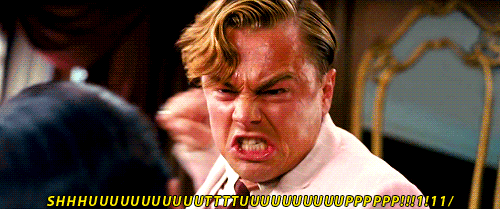
Sometimes you should know to not write at all:

So before writing anything, any scene, just take a break for a second, and think for yourself, whether that scene makes any sense from the point of view of the characters involved in that scene. What are their backgrounds? Think on how you can improve it. The ideas won’t come suddenly, but you don’t have to write everything in the first attempt itself. When you get a new idea, you can always come back and edit that scene, and thus make it rich.
If you keep writing, reading, and researching, then you’ll automatically learn all the necessary nuances of the writing eventually. Then you can get creative and develop your own style of writing. Actually, you’ll already have a style by then, but you just need to realize that and maintain a similar level for all your work because your readers will be expecting that from you.
If you don't know how to control yourself during writing... This is how the result may very well end up.
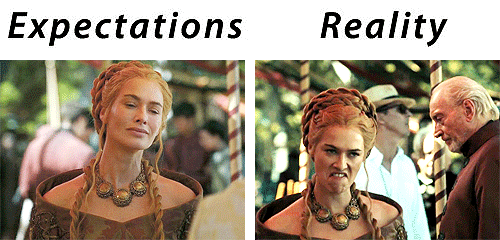
If the readers don't think that the character shouldn't behave like that, then they are gonna come at you hard... Understand that readers get merciless when you don't meet their expectations. This is the reality, and remember that you're no longer in the matrix.
If you want to know how to write to meet their expectations, don’t just read novels as a reader, but also read them as a writer. Then, trust me, you’ll find goldmines in their text. Each decent novel you read will teach you at least one new good thing. I can totally vouch for that.
However, to be able to analyze those novels, you first need to know how to crawl. But sadly crawling is not as intuitive to writers as it’s to kids. It doesn’t come to us genetically. Well, maybe if you are Stephen King’s children, it could be the case, but I’m positive that’s not the case.
What do you say, Mr. Stephen?

So, if you are not a descendant of Stephen King or the likes of him, then you should find resources online and learn how to write novels, the stages that exist in writing from the first draft to publishing, and what you do in each of those stages. From a basic level to a deep level, research as deep as you can. But don't blitz through the process and marathon it instead. If you learn something fast without a proper basement, you're more likely to forget it fast as well.
So... what kind of things would you be learning in this series? All of these parts relate to dialogue writing in one way or the other. Here are some examples: Conflict, tension, setting, Direct and Indirect dialogue, show vs tell, tags, cues, characterization, beats, redundancy, deep pov, adverbs, body language, hesitancy, manners, realistic characters, and the list goes on…
- What’s right or wrong?
- When it’s right or wrong?
- Why it’s right or wrong?
There is always a way, a proper way, to learn and do every good thing. Still, there are those who prefer to eat bananas including the skin, as those who think more exclamations will bring greater impact to the scene. I mean, even monkeys know how to eat bananas, which they do after peeling the skin, wherefore how can we as humans act lower than monkeys?
Ahem, anyway, just like how there’s a proper way of eating bananas, there’s a proper way of doing everything else.
And I want to share my views on how to properly learn to write Dialogue, thereby make this Mastering Dialogue series one of the time-saving reads for as many dialogue-delving writers as possible. I, by no means, am a writer who knows the ins and outs of this craft, but I’m aspiring to be that writer, which is also a reason why I’m writing this series. Having said that, the main reason is to help others who are looking for that one tutorial series that teaches more than they can learn from thousands of articles spread out on multiple websites.
Now, you may ask why I’m focusing on dialogue writing and not on other aspects as well.
Well, I’m focusing on dialogue because there are no great emotional scenes or drama without it, no great romance without it, no great fight scenes without it, in fact, no great fiction without it. No matter how good of a narrator one might be, he/she can’t clutch the hearts of readers with narration alone.
“In the fiction-writing universe, a professional narrator pales in front of a professional dialogue writer.”
I think you now know the answer.
A great novel can be written without using any narration whatsoever, and just by using dialogues, dialogue attributions, dialogue tags, and dialogue cues, and such—where our descriptions and details of the characters and our fictional world subtly lie in.
However, Narration is still used by everyone because of various reasons like:
- Word limit for publication
- To not waste words on not so important scenes
- To bring more variation and thus richness into one’s writing
- To describe action scenes or intimate scenes in an effective way.
The reasons can go on; you get the point. However, it’s neither narration nor exposition but dialogue which is the key that connects your readers with the characters in your story.
That is why knowing how to write a great dialogue is a must if you want to write great stories.
I’ve been writing fiction for only a few years, and I am still learning things. I will be improving/updating this series as I learn new things and concepts. As for how many parts there will be, I think the number will comfortably cross 30. After covering the dialogue, I will talk a bit about narration and exposition as well.
This Mastering Dialogue series is made so that it will help everyone improve their skills in dialogue writing. This series is gonna be long as dialogue writing is a huge concept and is also probably the most important and necessary skill for anyone who's aspiring to become a professional writer for novels or any writing jobs.
In this zeroth part, I won't be going into the technicalities of writing dialogue but will only talk about the basics that revolve around writing well in general.
First of all, what is fiction?
“Fiction is not real, but it resembles reality.”
Now, are you a good writer? What do you think about your own writing?
If you think it’s great then that’s fine. But before you reassure yourself again, just go and ask ten more people (asking avid readers or writers would be good) on how they feel about your work. And…
WOULD YOU BELIEVE ME?
WAIT, JUST WAIT...
WELL…
If you chose to come out of the matrix, then I appreciate that, but I won't congratulate you just yet because you just started, and there's still so much more to do... If you chose to not come out, however, you can rest inside as you always do.
Now, to those who got out of the shell where dreams delve in, let's now delve into reality, shall we?
No matter what you may think about your writing, it doesn't matter. If you are writing for the first time, then your writing most likely sucks. I've been there, and trust me, every good writer's been there.
The sad truth is, you may think your writing is great, but if most others think it’s garbage, then I think you should consider changing your style of writing. Because there’s something seriously affecting your novel in the wrong way. It need not be the plot by any means. It may just be the way you write from how you construct a dialogue and let the characters interact to how your basic writing style is in itself.
To learn to run, you should first learn to stand. To learn to stand, you should first try. And without a doubt, you’ll fall many times before you finally stand on your feet and be able to walk without falling no more or at least not as often.
And, in a similar way…
To write well, you should first know how not to write. And also to not write well in the wrong place, like the kid who did well to stand but was standing at the wrong spot. (Poor kiddo. Hope, he wasn’t hurt in the process.)
Because, if you don’t know how you should not write, you may think that crawling is actually walking.
A kid may think he’s walking while he’s still crawling on four legs. Only by looking at other adults (not other kids), will he learn that he’s doing it wrong and that he needs to stand on his two legs.
Only by reading and analyzing how other good writers are writing, and comparing it to what you wrote, will you be able to tell not only how different both the writing styles are, but how the other writers are conveying their messages using their scenes. Their fights may just be one page in length, while you are using twenty pages. Their love scenes maybe five pages long, while you are only using a paragraph or two for that.
Depending on the genre you’re writing in, your scenes can vary with other writers. So look at other novels that are of the same genre. But don’t follow them blindly.
Even some established writers write many anti-climactic scenes i.e. They build the tension for a scene from quite a few chapters only to end it in a single paragraph much less a page. For example, imagine how if you’ve trained your protagonist for the first hundred pages of the novel by teaching him this martial art and that martial art and whatnot, but when the time comes for him to actually fight for the first time, he’s surrounded by a dozen or even a hundred men, but you just kill them all off in a paragraph or two. This tactic of extremely short fights can be used by overpowered characters, but still, they should be handled correctly, or else the fight scene will simply be bland. Your readers will forget the scene as fast as they finished it.
Do you think, a protagonist who’s in his first fight can fight with a dozen men and face no problem whatsoever? I’d say that’s bullshit. He must be going through tons of psychological stress as he goes through the fight, be it excitement or trepidation or disdain, whatever it is, you should show that. Let the readers know about the characters, let them relate to the characters. Only that will save your novel and will keep the readers continuing even when they don’t like where the plot may be heading. Because they are already invested in your characters as they got to know them, from in and out.
To be able to write good characters, you obviously should know how to write good dialogues. Without dialogues, it’s impossible to write a novel, because the resulting book would be the worst thing your reader has ever read, a three hundred page of a mess that messed up their brain.
Sometimes you should know to write more:
Sometimes you should know to write less:
Sometimes you should know to not write at all:
So before writing anything, any scene, just take a break for a second, and think for yourself, whether that scene makes any sense from the point of view of the characters involved in that scene. What are their backgrounds? Think on how you can improve it. The ideas won’t come suddenly, but you don’t have to write everything in the first attempt itself. When you get a new idea, you can always come back and edit that scene, and thus make it rich.
If you keep writing, reading, and researching, then you’ll automatically learn all the necessary nuances of the writing eventually. Then you can get creative and develop your own style of writing. Actually, you’ll already have a style by then, but you just need to realize that and maintain a similar level for all your work because your readers will be expecting that from you.
If you don't know how to control yourself during writing... This is how the result may very well end up.
If the readers don't think that the character shouldn't behave like that, then they are gonna come at you hard... Understand that readers get merciless when you don't meet their expectations. This is the reality, and remember that you're no longer in the matrix.
If you want to know how to write to meet their expectations, don’t just read novels as a reader, but also read them as a writer. Then, trust me, you’ll find goldmines in their text. Each decent novel you read will teach you at least one new good thing. I can totally vouch for that.
However, to be able to analyze those novels, you first need to know how to crawl. But sadly crawling is not as intuitive to writers as it’s to kids. It doesn’t come to us genetically. Well, maybe if you are Stephen King’s children, it could be the case, but I’m positive that’s not the case.
What do you say, Mr. Stephen?
So, if you are not a descendant of Stephen King or the likes of him, then you should find resources online and learn how to write novels, the stages that exist in writing from the first draft to publishing, and what you do in each of those stages. From a basic level to a deep level, research as deep as you can. But don't blitz through the process and marathon it instead. If you learn something fast without a proper basement, you're more likely to forget it fast as well.
So... what kind of things would you be learning in this series? All of these parts relate to dialogue writing in one way or the other. Here are some examples: Conflict, tension, setting, Direct and Indirect dialogue, show vs tell, tags, cues, characterization, beats, redundancy, deep pov, adverbs, body language, hesitancy, manners, realistic characters, and the list goes on…
Comments (0)